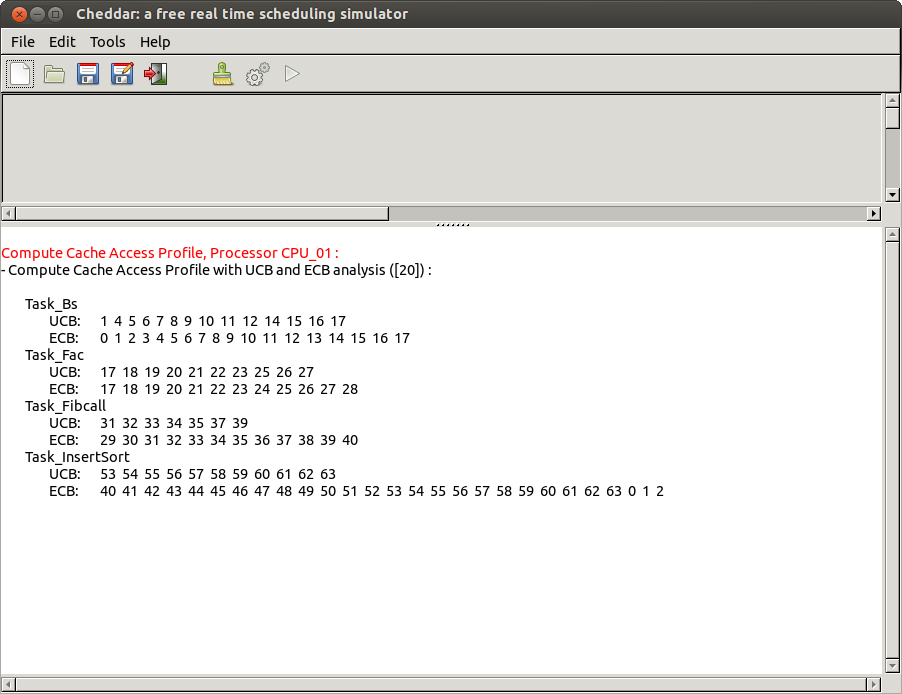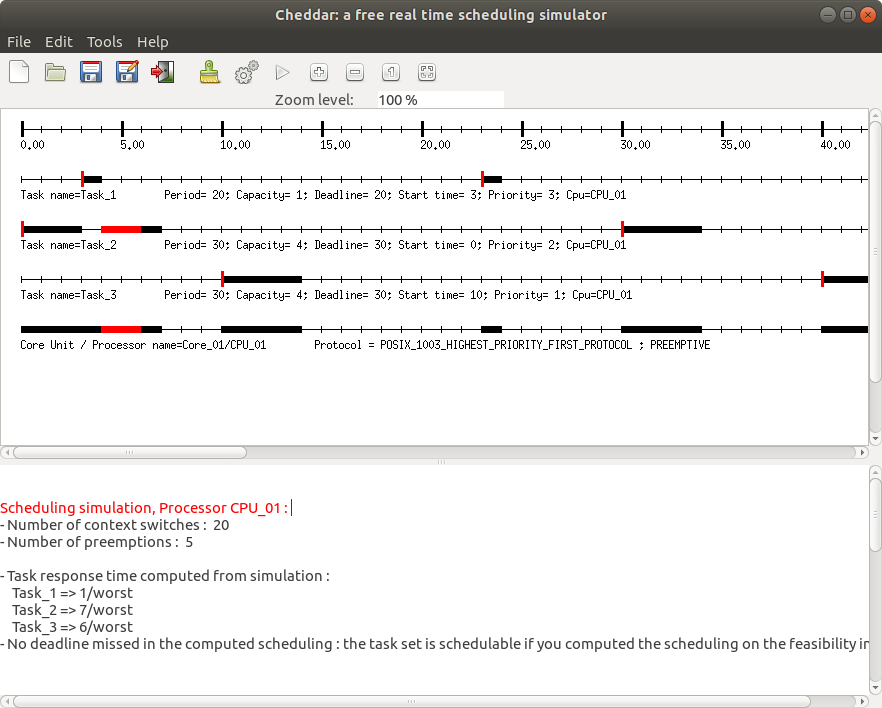
In this recipe, we describe an architecture where computing units have shared hardware resources such as a cache unit.
We assume an uniprocessor system with one level of direct-mapped instruction cache that consists of independent stricly periodic tasks.
A task has an associated control flow graph (CFG) described by the attribute CFG_Name.
This CFG is used to compute a task's cache access profile, which is required to run any cache related preemption delay (CRPD) analyses implemented in Cheddar.
Here is a simplified example of this recipe
(which can be downloaded here):
package Cache_Analysis
public
with Cheddar_Multicore_Properties;
with Cheddar_Transformation_Properties;
with memory_units;
processor CPU_01
end CPU_01;
processor implementation CPU_01.Core_01
subcomponents
L1_Instruction_Cache : memory memory_units::Cache.impl {
Memory_Size => 1024Bytes;
Cheddar_Multicore_Properties::Line_Size => 16Bytes;
Cheddar_Multicore_Properties::Cache_Type => Instruction_Cache;
Cheddar_Multicore_Properties::Cache_Level => 1;
Cheddar_Multicore_Properties::Associativity => 1;
Cheddar_Multicore_Properties::Cache_Size => 1024;
Cheddar_Multicore_Properties::Block_Reload_Time => 1 us .. 2 us;
};
properties
Scheduling_Protocol=>(POSIX_1003_HIGHEST_PRIORITY_FIRST_PROTOCOL);
end CPU_01.Core_01;
------------------------------------------------
system Cache_benchmark
end Cache_benchmark;
system implementation Cache_benchmark.impl
subcomponents
Hard : processor CPU_01.Core_01;
Soft : process Malardalen.impl;
properties
Actual_Processor_Binding => (reference (Hard)) applies to Soft;
Cheddar_Transformation_Properties::Exported_Attribute_Time_Units => MicroSecond;
end Cache_benchmark.impl;
process Malardalen
end Malardalen;
process implementation Malardalen.impl
subcomponents
Bs : thread Task_Bs;
Fac : thread Task_Fac;
Fibcall : thread Task_Fibcall;
InsertSort : thread Task_InsertSort;
end Malardalen.impl;
thread Task_Bs
properties
period => 1000us;
Dispatch_Protocol => Periodic;
Compute_Execution_Time => 76us..76us;
Deadline => 1000us;
Cheddar_Multicore_Properties::CFG_Name => "CFG_bs";
Cheddar_Multicore_Properties::CFG_Relocatable => True;
Cheddar_Multicore_Properties::Text_Memory_Start_Address => 0;
end Task_Bs;
thread Task_Fac
properties
period => 1500us;
Dispatch_Protocol => Periodic;
Compute_Execution_Time => 125us..125us;
Deadline => 1500us;
Cheddar_Multicore_Properties::CFG_Name => "CFG_fac";
Cheddar_Multicore_Properties::CFG_Relocatable => True;
Cheddar_Multicore_Properties::Text_Memory_Start_Address => 0;
end Task_Fac;
thread Task_Fibcall
properties
period => 1500us;
Dispatch_Protocol => Periodic;
Compute_Execution_Time => 300us..300us;
Deadline => 1500us;
Cheddar_Multicore_Properties::CFG_Name => "CFG_fibcall";
Cheddar_Multicore_Properties::CFG_Relocatable => True;
Cheddar_Multicore_Properties::Text_Memory_Start_Address => 0;
end Task_Fibcall;
thread Task_InsertSort
properties
period => 2000us;
Dispatch_Protocol => Periodic;
Compute_Execution_Time => 450us..450us;
Deadline => 2000us;
Cheddar_Multicore_Properties::CFG_Name => "CFG_insertsort";
Cheddar_Multicore_Properties::CFG_Relocatable => True;
Cheddar_Multicore_Properties::Text_Memory_Start_Address => 0;
end Task_InsertSort;
end Cache_Analysis;
This model assume the following definition from package memory_units
(from here)::
package memory_units
public
memory Cache
end Cache;
memory implementation Cache.impl
end Cache.impl;
...
The model above contains a processor component (called CPU_01).
The processor has a single core unit (called Core_01) and a cache (called L1_Instruction_Cache).
The solution models 4 threads : Task_Bs, Task_Fac, Task_Fibcall, and Task_InsertSort.
They are programs taken from the Malardalen benchmark.
Each thread is defined as periodic, with a deadline, a priority and an execution time.
Execution time of thread is defined by a time interval, with a worst case and a best case specified with the Compute_Execution_Time property.
All those properties are defined inside the process component: notice the applies to to make reference to the thread at which the property value has to be assigned.
Each task has an associated control flow graph (CFG) stored in an external file with the name given by the attribute CFG_Name.
Cheddar has an analysis feature which allows the computation of a task's cache access profile by using its CFG.
If a CFG is relocatable (CFG_Relocatable => True), it can be placed at any address in the memory.
Otherwise, the CFG must be placed at the address specified by the attribute Text_Memory_Start_Address.
Cache AADL properties
Cheddar proposes a set of properties allowing the designer to express most of the usual
cache units characteristics but also data related to CFG:
-- Cache properties
--
Supported_Addressing_Type : type enumeration (
Virtual_Addressing, Physical_Addressing);
Addressing_Type : Cheddar_Multicore_Properties::Supported_Addressing_Type applies to (memory, system);
Supported_Cache_Type : type enumeration (
Data_Cache,
Instruction_Cache,
Unified_Cache);
Cache_Type : Cheddar_Multicore_Properties::Supported_Cache_Type applies to (memory, system);
Cache_Level : aadlinteger applies to (memory, system);
Cache_Size : aadlinteger applies to (memory, system);
Line_Size : size applies to (memory, system);
Associativity : aadlinteger applies to (memory, system);
Block_Reload_Time : Time_Range applies to (memory, system);
Supported_Replacement_Policy_Type : type enumeration (
Random, LRU, LRR, FIFO);
Replacement_Policy_Type : Cheddar_Multicore_Properties::Supported_Replacement_Policy_Type applies to (memory, system);
Supported_Coherence_Protocol_Type : type enumeration (
Private_Cache,
Shared_Cache,
Private_Invalid_Cache,
Private_MSI,
Private_MESI);
Coherence_Protocol_Type : Cheddar_Multicore_Properties::Supported_Coherence_Protocol_Type applies to (memory, system);
Supported_Write_Policy_Type : type enumeration (
Write_Back,
No_Allocated_Write_Through,
Allocated_Write_Through,
Write_Through);
Write_Policy_Type : Cheddar_Multicore_Properties::Supported_Write_Policy_Type applies to (memory, system);
-- CFG properties
--
CFG_Name : aadlstring applies to (thread);
CFG_Relocatable : aadlboolean applies to (thread);
Text_Memory_Start_Address : aadlinteger applies to (thread);
UCBs : list of aadlinteger applies to (thread);
ECBs : list of aadlinteger applies to (thread);
Properties applied to cache memory unit:
- Cache_Type: This property specifies the type of cache
- Cache_Level: Level 1 --> a cache is associated to a core. Level 2 --> a cache is associated to a processors
- Cache_Size: This property specifies the size of a cache
- Line_Size: This property specifies the size of a cache line
- Associativity: This property specifies the associativity of a cache
- Associativity = 0: Fully associative cache
- Associativity = 1: Direct mapped cache
- Associativity = >0: Set associative cache
- Block_Reload_Time: This property specifies an upper-bound on the time it takes to load a memory block into the cache
- Replacement_Policy_Type: This property specifies the replacement policy of a cache
- Direct mapped cache (Associativity = 1) does not require a replacement policy
- Fully associative (Associativity = 0) and set associative cache (Associativity > 1) do require a replacement policy.
-
Coherence_Protocol_Type: This property specifies the management rule applied to a cache.
It is modeled but analysis are not supported in Cheddar at the moment.
- Write_Policy_Type : This property specifies the write policy applied to a cache.
It is modeled but analysis are not supported in Cheddar at the moment.
Properties applied to thread:
- CFG_Name: name of the Cheddar xmlv3 file storing the control flow graph for a thread (CFG)
- CFG_Relocatable: this property specifies whether we can relocate the CFG in the memory
- If CFG_Relocatable = true, analysis tools can relocate the CFG in the memory by changing the value of Text_Memory_Start_Address
- If CFG_Relocatable = false, analysis tools cannot relocate the CFG
- Text_Memory_Start_Address: this property specifies the position of a CFG in the memory.
It is the address of the basic block with the lowest memory address.
We take an assumption that basic blocks are allocated continuously.
If Text_Memory_Start_Address = -1, it means that it is not specified
- UCBs, ECBs: The properties specifiy the set of useful cache blocks (UCB) and evicting cache blocks (ECB) of a task.
We allow the users to describe the UCBs and ECBs of a thread.
There are two options:
- 1. Use Cheddar to compute the sets of UCBs and ECBs.
In this case, the user does not need to specify the sets of UCBs and ECBs.
-
2. Pre-compute the sets of UCBs and ECBs.
In this case, the user needs to specify the sets the CFG
Cache interference in Cheddar is based on the concepts of Cache Related Preemption Delay (CRPD).
The bounds on the CRPD are computed by using :
- Useful Cache Block [LEE 98]
- Evicting Cache Block[BUS 95]
The following process is required to run the CRPD analyses implemented in Cheddar.
-
1. Control Flow Graph (CFG) computation.
Cheddar provides supports for modeling the CFG of a task.
An external tool is used to parse the object file of a task and then to compute and generate the CFG in a Cheddar-compatible format.
Examples of the CFGs computed for tasks in the
Malardalen benchmark
are available on the Cheddar svn repository at this
link.
- 2. Import/create a Cheddar-ADL system model and import its CFGs
The users can import an existing system model with several tasks in Cheddar or choose to create a new model.
After that, the CFGs of these tasks can imported by Cheddar :
Menu --> Tools --> Cache --> Import Control Flow Graph
- If the users import a Cheddar-ADL system model, the CFGs must be located in the same folder as the xml file.
- If the users create a new system model, the CFGs must be located in the same folder with the Chedder executable file.
- The attribute "cfg_name" is used to associate a CFG to a task.
The xml file contains the CFG must has the same name as Cheddar automatically search for the CFGs to be imported.
The current GUI of Cheddar does not provide an interactive way to work (add/modify/delete) with CFGs.
The features are to be implemented in the next version.
- 3. UCBs and ECBs computation
The sets of UCBs and ECBs of a program are computed by Cheddar from its CFG.

The sets of UCBs and ECBs can also be computed by external tools and put directly in Cheddar without passing by this step.
In order to do this, the users need to modify the xml file of a Cheddar-ADL system model with the information about the UCBs and ECBs of tasks.
After this step, the following analyses are available in Cheddar
-
4.1 CRPD-Aware WCRT analysis
In order to perform CRPD-Aware WCRT analysis in Cheddar, the following steps are required:
- The set of UCBs and ECBs of all tasks must be computed (Step 3).
Menu --> Tools --> Scheduling --> Feasibility Test Options-
The following tests are available in Cheddar:
-
4.2 CRPD-Aware Scheduling Simulation [TRA 16a]
In order to perform CRPD-aware scheduling simulation in Cheddar, the following steps are required.
- The set of UCBs and ECBs of all tasks must be computed (Step 3).
- Check the CRPD check box in
Tools --> Scheduling --> Scheduling Options
-
Run the simulation.
The CRPD added to the capacities of tasks are represented by the red blocks (as shown in the image below)

-
4.3 CRPD-Aware Prority Assignment [TRA 16b]
Our implementation of the CRPD-aware priority assignment is based on Audsley's Optimal Priority Assignment (OPA) algorithm.
We extended this algorithm in order to take into account the CRPD.
In order to perform CRPD-aware prority assignment in Cheddar, the following steps are required.
- The set of UCBs and ECBs of all tasks must be computed (Step 3).
Tools --> Scheduling --> Scheduling Options --> Tasks Priority Assignment-
The following CRPD priority assignment algorithms, which are detailed in the referenced article, are available in Cheddar:
- CRPD OPA-PT
- CRPD OPA-PT Simplified
- CRPD OPA-PT Tree
donner au moins 1 exercice (voire 2 exercice, ca serait parfait!


